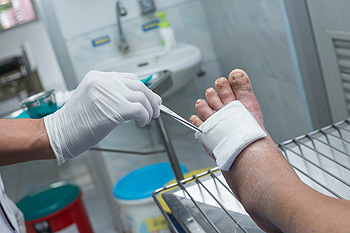Items filtered by date: January 2022
Mobility Is Key to Quality of Life in the Elderly
Keeping aging adults ambulatory is considered by many to be essential. Mobility is believed to provide the elderly with dignity, independence, and self-esteem. Foot care plays an important part in the aging adult’s mental health and quality of life, and it should be equal to care they receive for other parts of their body. This is particularly true for elderly patients with chronic diseases, like diabetes. Older adults should be educated on proper foot care, and have their foot health regularly monitored and assessed by a podiatrist. This is important to help the older adults stay mobile while avoiding complications that can result from a foot condition that is ignored or goes undetected. To help ensure your foot health or that of your loved one, it's a good idea to make an appointment with a podiatrist today.
If you need your feet checked, contact one of our podiatrists of Geller Foot Clinic. Our doctors will attend to all of your foot and ankle needs and provide you with quality treatment.
Geriatrics and Podiatry
When people age, some common issues that may occur are bone density loss, dry skin, poor circulation, and rough brittle nails. These issues may also affect your foot health if the necessary steps are not taken to alleviate the problems.
It is important to take care of your feet because feet that are injured or diseased can affect your overall health. Having painful feet hinders your ability to do daily activities or may decrease your willingness to do the things that you need to do.
Visiting Your Geriatrician
As we age, health problems become more likely, so it is essential to visit your doctor for check-ups to ensure that you are doing the best you can to take care of your health. It is recommended to check your feet frequently for any possible cuts, bruises, swelling, corns or any other irregularities.
Taking Care of Elderly Feet
Cracked or dry feet can be treated by applying moisturizer often. It is also important not to wear old socks because the older the sock is, the higher the possibility there will be that there is bacteria there. Wear fresh socks and make sure they fit properly.
Proper foot health means that you can have a more active lifestyle and you will not be bogged down by pain. Foot health also leads to good circulation, which is paramount for overall health.
If you have any questions, please feel free to contact our office located in Lathrup Village, MI . We offer the newest diagnostic tools and technology to treat your foot and ankle needs.
Why the Plantar Fascia Becomes Painful and Inflamed
Millions of people seek relief from plantar fasciitis every year. Plantar fasciitis is a condition that affects the plantar fascia, which is a fibrous band of tissue that attaches to the heel bone and runs along the bottom of the foot, fanning out and attaching to the long metatarsal bones in the forefoot. While walking or running the plantar fascia contracts and stretches. This repetitive pressure on the plantar fascia can cause tiny micro-tears and inflammation to develop at the site where the tissue attaches to the heel bone. Pain associated with plantar fasciitis is usually worse in the morning, when the plantar fascia is stretched suddenly after it has been in a relaxed and shortened state during sleeping hours. Podiatrists treat patients with plantar fasciitis very frequently and have developed many successful treatment protocols to reduce pain and inflammation caused by this common disorder. If you are suffering from heel pain, contact a podiatrist near you to have your condition properly diagnosed and treated.
Plantar fasciitis can be very painful and inconvenient. If you are experiencing heel pain or symptoms of plantar fasciitis, contact one of our podiatrists from Geller Foot Clinic. Our doctors can provide the care you need to keep you pain-free and on your feet.
What Is Plantar Fasciitis?
Plantar fasciitis is the inflammation of the thick band of tissue that runs along the bottom of your foot, known as the plantar fascia, and causes mild to severe heel pain.
What Causes Plantar Fasciitis?
- Excessive running
- Non-supportive shoes
- Overpronation
- Repeated stretching and tearing of the plantar fascia
How Can It Be Treated?
- Conservative measures – anti-inflammatories, ice packs, stretching exercises, physical therapy, orthotic devices
- Shockwave therapy – sound waves are sent to the affected area to facilitate healing and are usually used for chronic cases of plantar fasciitis
- Surgery – usually only used as a last resort when all else fails. The plantar fascia can be surgically detached from the heel
While very treatable, plantar fasciitis is definitely not something that should be ignored. Especially in severe cases, speaking to your doctor right away is highly recommended to avoid complications and severe heel pain. Your podiatrist can work with you to provide the appropriate treatment options tailored to your condition.
If you have any questions please feel free to contact our office located in Lathrup Village, MI . We offer the newest diagnostic and treatment technologies for all your foot and ankle needs.
Tips for Preventing Diabetic Foot Ulcers
 Many diabetics are at risk of developing foot ulcers that are typically found under the big toe and the ball of the foot. If an ulcer goes undetected, it can lead to a deterioration of the skin, right down to the bone. And if infected, it can become life threatening. About a quarter of all diabetics develop ulcers, but there are ways to keep them from forming in the first place. It’s important to check your feet daily, looking for skin tears, calluses, blisters or any open cut, sore or wound. Keep your feet clean by washing them in warm soapy water and thoroughly drying them, especially between the toes. Apply lotion to keep the feet from drying out and cracking. Avoid going barefoot or wearing shoes without socks. Some other tips include, wearing shoes that fit properly, taking prescribed medications, checking sugar levels and exercising regularly. If calluses or corns have formed on your feet, it is wise to make an appointment with a podiatrist, who can safely remove them and check your feet for any other skin problems.
Many diabetics are at risk of developing foot ulcers that are typically found under the big toe and the ball of the foot. If an ulcer goes undetected, it can lead to a deterioration of the skin, right down to the bone. And if infected, it can become life threatening. About a quarter of all diabetics develop ulcers, but there are ways to keep them from forming in the first place. It’s important to check your feet daily, looking for skin tears, calluses, blisters or any open cut, sore or wound. Keep your feet clean by washing them in warm soapy water and thoroughly drying them, especially between the toes. Apply lotion to keep the feet from drying out and cracking. Avoid going barefoot or wearing shoes without socks. Some other tips include, wearing shoes that fit properly, taking prescribed medications, checking sugar levels and exercising regularly. If calluses or corns have formed on your feet, it is wise to make an appointment with a podiatrist, who can safely remove them and check your feet for any other skin problems.
Diabetic foot care is important in preventing foot ailments such as ulcers. If you are suffering from diabetes or have any other concerns about your feet, contact one of our podiatrists from Geller Foot Clinic. Our doctors can provide the care you need to keep you pain-free and on your feet.
Diabetic Foot Care
Diabetes affects millions of people every year. The condition can damage blood vessels in many parts of the body, especially the feet. Because of this, taking care of your feet is essential if you have diabetes, and having a podiatrist help monitor your foot health is highly recommended.
The Importance of Caring for Your Feet
- Routinely inspect your feet for bruises or sores.
- Wear socks that fit your feet comfortably.
- Wear comfortable shoes that provide adequate support.
Patients with diabetes should have their doctor monitor their blood levels, as blood sugar levels play such a huge role in diabetic care. Monitoring these levels on a regular basis is highly advised.
It is always best to inform your healthcare professional of any concerns you may have regarding your feet, especially for diabetic patients. Early treatment and routine foot examinations are keys to maintaining proper health, especially because severe complications can arise if proper treatment is not applied.
If you have any questions please feel free to contact our office located in Lathrup Village, MI . We offer the newest diagnostic and treatment technologies for all your foot and ankle needs.
Why Live with Pain and Numbness in Your Feet?
Do You Have an Ingrown Toenail?
 When the corner of a toenail grows into the surrounding skin instead of over it, an ingrown toenail can form. While an ingrown toenail can happen to any of the toes, it usually occurs on the big toe. Ingrown toenails can develop for several reasons like cutting the toenail too short, rounding the corner of the nail when cutting it, wearing shoes that are too tight, or trauma, such as stubbing the toe. The most prevalent symptom of an ingrown toenail is pain where the nail is growing into the skin, and a red or swollen appearance to the affected skin. Ingrown toenails can also get infected and may drain pus. If you have an infected ingrown toenail or one that is very painful, it is suggested that you consult with a podiatrist.
When the corner of a toenail grows into the surrounding skin instead of over it, an ingrown toenail can form. While an ingrown toenail can happen to any of the toes, it usually occurs on the big toe. Ingrown toenails can develop for several reasons like cutting the toenail too short, rounding the corner of the nail when cutting it, wearing shoes that are too tight, or trauma, such as stubbing the toe. The most prevalent symptom of an ingrown toenail is pain where the nail is growing into the skin, and a red or swollen appearance to the affected skin. Ingrown toenails can also get infected and may drain pus. If you have an infected ingrown toenail or one that is very painful, it is suggested that you consult with a podiatrist.
Ingrown toenails may initially present themselves as a minor discomfort, but they may progress into an infection in the skin without proper treatment. For more information about ingrown toenails, contact one of our podiatrists of Geller Foot Clinic. Our doctors can provide the care you need to keep you pain-free and on your feet.
Ingrown Toenails
Ingrown toenails are caused when the corner or side of a toenail grows into the soft flesh surrounding it. They often result in redness, swelling, pain, and in some cases, infection. This condition typically affects the big toe and may recur if it is not treated properly.
Causes
- Improper toenail trimming
- Genetics
- Improper shoe fitting
- Injury from pedicures or nail picking
- Abnormal gait
- Poor hygiene
You are more likely to develop an ingrown toenail if you are obese, have diabetes, arthritis, or have any fungal infection in your nails. Additionally, people who have foot or toe deformities are at a higher risk of developing an ingrown toenail.
Symptoms
Some symptoms of ingrown toenails are redness, swelling, and pain. In rare cases, there may be a yellowish drainage coming from the nail.
Treatment
Ignoring an ingrown toenail can have serious complications. Infections of the nail border can progress to a deeper soft-tissue infection, which can then turn into a bone infection. You should always speak with your podiatrist if you suspect you have an ingrown toenail, especially if you have diabetes or poor circulation.
If you have any questions, please feel free to contact our office located in Lathrup Village, MI . We offer the newest diagnostic and treatment technologies for all your foot care needs.



